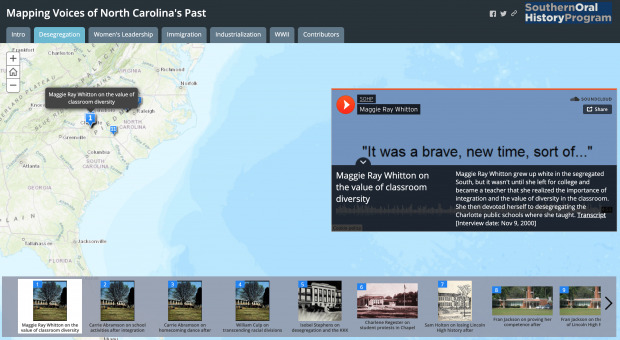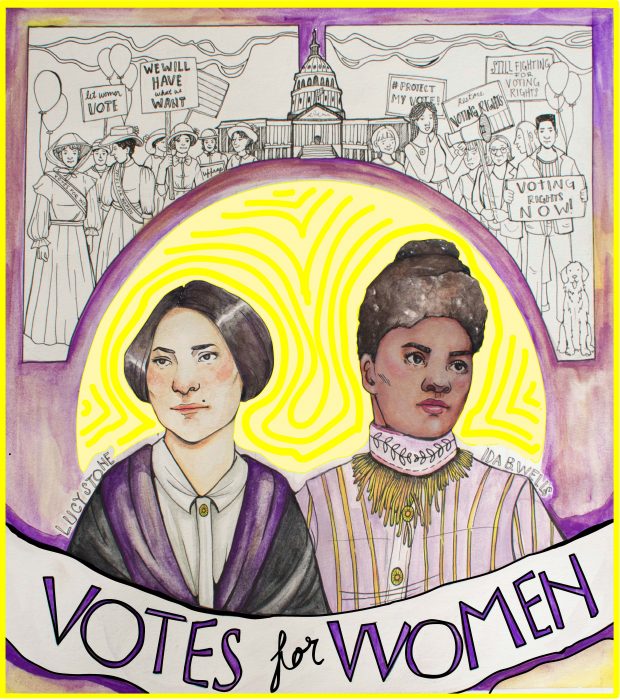
Civil Rights Oral History Lesson Plans
Oral history interviews provide tangible access to the past, with narrators offering first-hand descriptions in their own voices of historical events, ideas, and mindsets. The SOHP, in collaboration with Carolina K-12, created lesson plans on teaching about the American Civil Rights Movement through oral history clips. The lessons offer a unique way to bring history alive for middle and high school students.
Access additional civil rights lessons that integrate oral histories here, and visit Carolina K-12’s database for hundreds of lessons and PowerPoints on numerous topics. The Carolina Oral History Teaching Fellows program was a collaboration between the Southern Oral History Program and Carolina K-12. Funding for this program was provided by the Southern Oral History Program, the North Caroliniana Society, the College of Arts & Sciences, and the Graduate School’s Bland Fellowship.

Centennial of the 19th Amendment
In the Centennial of the 19th Amendment teaching resource, SOHP undergraduate interns created a guide utilizing oral histories from the SOHP’s archive and project,The NC 2020 Coalition Oral History Project. The lesson plans break into themes of voter suppression; intersectionality; activism in voting; and voting in memory. Oral history interview excerpts from archival projects on voting rights provide historical context for the continuing fight for equality and voting rights in the South.
Explore the teaching resource and corresponding oral history interview excerpts.
The NC 2020 Coalition Oral History Project
The NC 2020 Coalition is a collaboration of organizations commemorating the centennial of the 19th Amendment. The coalition focuses on commemorating the anniversary by sharing information on events around North Carolina and on the history of suffrage efforts in the United States. Working together, the group’s purpose is to promote accuracy of the historical record, showcase legal and social advances in gender equality since the amendment’s passing, and describe its relevance in the current fight for equal rights. In collaboration with the NC 2020 Coalition, students of the SOHP conducted oral histories with women and transgender men involved with the coalition. In The NC2020 Coalition Oral History Project, the process of the construction in public historical commemoration meets the process of individual remembering. In working together to figure out how to collectively remember the complex history of the Women’s Suffrage Movement, these interviewees each bring their own sometimes conflicting, sometimes overlapping memories of women’s activism, voting, and citizenship. The project will launch gradually throughout fall 2020 leading up to the November 2020 election.

Mapping Voices of North Carolina's Past
Mapping Voices of North Carolina’s Past is an interactive map featuring oral history interviews with people from North Carolina’s past. This map and the accompanying discussion guide below are intended for K-12 teachers to help their students experience history through stories.
Students can explore school desegregation or listen to women talk about their fight for equal rights. By comparing audio clips, students can ask new questions: How did black students experience school desegregation differently from white classmates? What has immigration meant to different people? Why has the rise and fall of textile factories been important to North Carolinians? What impacts have newer industries and infrastructural developments had on the state?
The Women’s Leadership Discussion Guide is intended to foster discussion in grades 8-12 classrooms about women’s leadership and the long fight for equal rights across North Carolina, based on the Southern Oral History Program’s interactive map. After students listen to audio clips from oral history interviews embedded in the map, teachers can utilize the discussion questions provided for whole class discussion, small group discussion, and/or writing assignments.